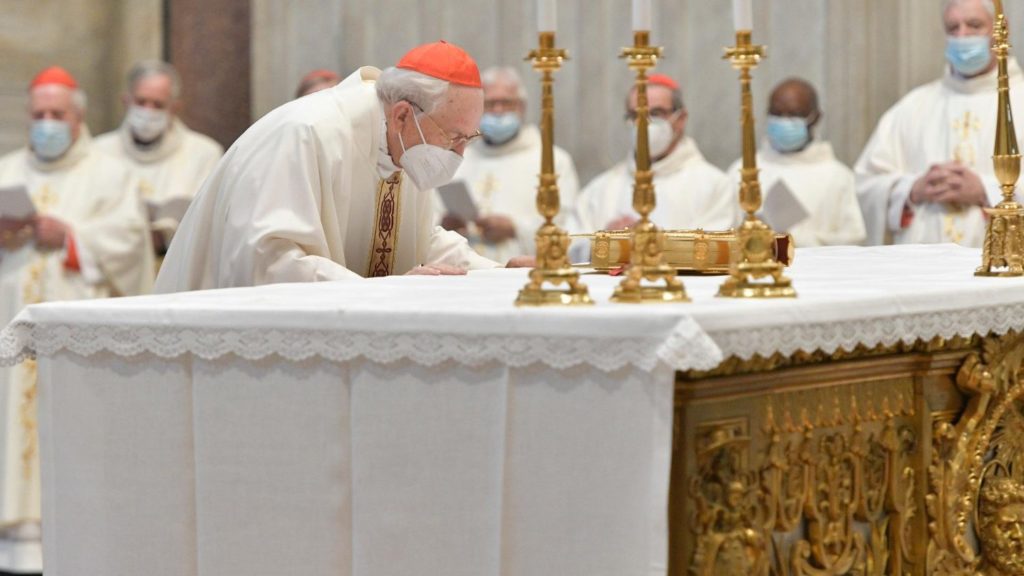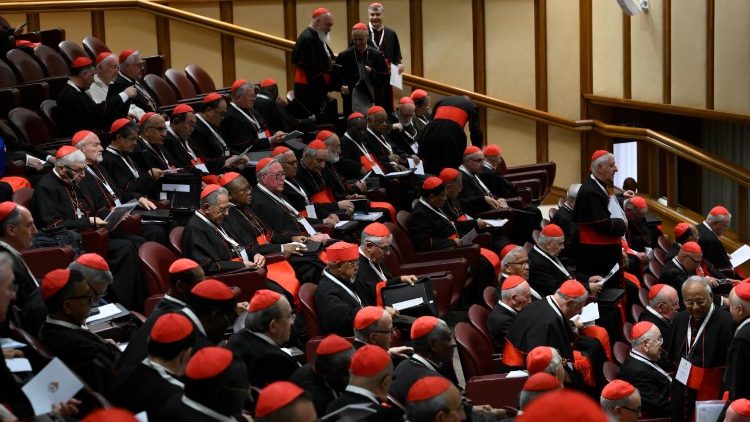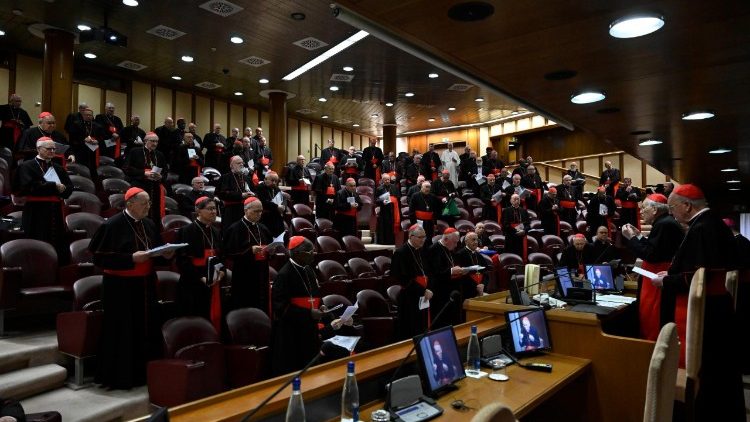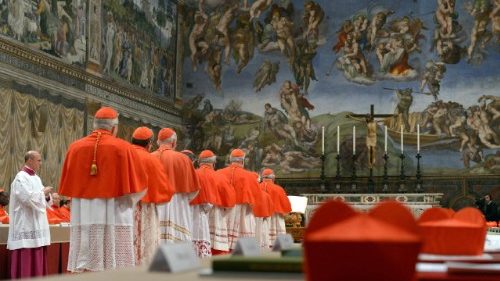Mass of the Last Supper on Holy Thursday
Presided by Cardinal Giovanni Battista Re, Dean of College of Cardinals

The Mass of the Last Supper was held today, Holy Thursday, at the Altar of the Chair, in the Basilica of St. Peter.
Cardinal Giovanni Battista Re, Dean of College of Cardinals, presided over the Mass, which marks the beginning of the Easter Triduum. During the celebration, the rite of the washing of the feet and the procession did not take place due to pandemic restrictions.
Concelebrating with Cardinal Re were some Cardinals and Bishops, the Superiors of the Secretariat of State, and the Canons of the Basilica.
Cardinal Re recalled in his homily that Christ loves us even to the point of dying on the cross.
“Holy Thursday evening, therefore, reminds us how much we have been loved; it tells us that the Son of God, out of His love for us, gave us not something, but He gave us Himself,” the Cardinal said.
Following is Cardinal Re’s homily, provided by the Vatican:
“Jesus knew that his hour had come to depart out of this world to the Father. Having loved his own who were in the world, he loved them to the end” (Gv.13,1).
These solemn words of the Evangelist John, that resounded a few moments ago, introduce the account of the washing of the feet of the disciples on the part of Our Lord Jesus Christ and open the memory of the gift of Himself that Jesus left us in the hour when he said good-bye; at the same time, they initiate the great discourse he pronounced on the vigil when he made an offering of Himself to the Father for our salvation.
This Eucharistic Celebration, laden with an extraordinary intensity of sentiment and thought, makes us relive the evening on which Christ, surrounded by His Apostles in the Cenacle, instituted the Eucharist and the priesthood and entrusted them with the commandment of fraternal love.
“He loved them to the end”; this touching affirmation means that He loved them to the point of dying on the cross the day after, on Good Friday. But it also means love in the extreme, that is, the highest and unsurpassable degree of His capacity to love.
Holy Thursday evening, therefore, reminds us how much we have been loved; it tells us that the Son of God, out of His love for us, gave us not something, but He gave us Himself
– His Body and His Blood – that is, the totality of His person, and that, for our redemption, he accepted to suffer the most ignominious death, offering Himself as a victim: “No one takes my life from me, but I lay it down of my own accord” (Jn 10:18).
The existence of the Eucharist can only be explained because Christ loved us and wanted to be near every one of us forever, even till the end of the world. Only a God could have imagined such a great gift and only an infinite power and love could have brought it about.
The Church has always considered the Sacrament of the Eucharist as the most precious gift it has been endowed with. It is the gift through which Christ walks with us as light, as strength, as nourishment, as help in all the days of our history.
Speaking of the Eucharist, the Second Vatican Council affirmed that it is “is the summit toward which the activity of the Church is directed; at the same time it is the font from which all her power flows” (Sacrosanctum Concilium, 10); it is “the fount and apex of the whole Christian life” (Lumen Gentium, 11).
Using the terms “font and summit”, “fount and apex”, the Second Vatican Council wanted to say that in the life and mission of the Church, everything comes from the Eucharist and everything leads to the Eucharist.
The Eucharist is the center and heart of the life of the Church. It must be the center and heart of the life of every Christian as well. Those who believe in the Eucharist never feel alone in life. They know that in the dimness and in the silence of all the churches there is Someone who knows their name, who knows their story, Someone who loves them, who waits for them, and who listens willingly. And before the tabernacle, everyone can confide whatever is in their heart and receive comfort, strength, and peace of heart.
The Eucharist is a reality not only to believe in but to be lived. The love of Christ for us impels us to give witness to mutual love on our part. The Eucharist is a call of openness to toward others, to fraternal love, to know how to forgive and to help those in difficulty; it is an invitation to solidarity, to support each other, to abandon no one; it calls us to an industrious commitment to the poor, the suffering, the marginalized; it is the light to recognize the face of Christ in the faces of our brothers and sisters, especially in the wounded and most in need.
The second mystery we recall this evening is the institution of the Catholic priesthood. Christ, the true priest, said to the Apostles: “Do this – that is, the Sacrament of the Eucharist – in memory of me”. And three days later, Easter Sunday evening, He also said to the Apostles: “Receive the Holy Spirit. If you forgive the sins of any, they are forgiven” (Jn 20:23). Thus,
Christ transmits on His Apostles the priestly powers so that the Eucharist and the Sacrament of Pardon might continue and be renewed in the Church. He gave humanity an incomparable gift.
On Holy Thursday in years past, after this Mass in Coena Domini, it was customary to prolong adoration of the Eucharist throughout the night with various initiatives of prayer and adoration and moments of immense religious intensity. The dramatic situation created by Covid-19, and the unfortunate risk this year of contamination, do not allow this, just as it happened last year. Returning, however, to our homes, we must continue to pray with our thoughts and our hearts filled with gratitude for Jesus Christ, who wanted to remain present among us as our contemporary under the appearances of bread and wine.
From Him, who experienced physical suffering and loneliness in His flesh and in His spirit, we want to draw the strength we need, now more than ever, to face the great challenges of this pandemic that is killing thousands of victims every day on this earth. We have experienced in a universal way how a small virus can bring the entire world to its knees. Until this tragedy subsides, we must have recourse to all the human means that science puts at our disposal, but another irreplaceable step is needed: we must raise a huge chorus of prayer so that the hand of God might come to our aid and end this tragic situation that has worrying consequences in the fields of health, employment, economy, education, and direct relationships with people. As Christ Himself taught us, it is necessary to go and knock loudly on the door of God, the Father Almighty (cf. Mt.7:7-8).
One last consideration. The evening that demonstrates the highest manifestation of love and friendship toward us is also the evening of betrayal. Around the same table in the Cenacle, God’s love and man’s betrayal faced each other. Saint Paul highlights this in the Second Reading of the Mass: “on the night when he was betrayed”.
In the story of the boundless love of Christ, who loved us “till the end”, there is the bitterness of human disloyalty and betrayal.
Holy Thursday is, therefore, also an invitation to become aware of our own sins; it is a call to put our lives in order a bit and to embark on the path of repentance and renewal to obtain God’s pardon.
In the Eucharist, God drew so near to us that we must never feel abandoned, because we are always sought by Him, loved and invited to obtain the joy of His pardon with repentance and with the Sacrament of Reconciliation and to begin a spiritual recovery with hearts open more to God and to all our brothers and sisters.
Pope Francis’ Schedule for Holy Week 2021
Related

On the Road to the Conclave: The Church Prepares to Elect the New Pope on May 7
Alberto Ramírez
29 April, 2025
2 min

What are the Congregations before the Conclave?
Exaudi Staff
29 April, 2025
3 min

The Conclave will begin on May 7
Exaudi Staff
28 April, 2025
1 min

Cardinal Parolin at the Novendalia Mass: “Mercy leads us to the heart of faith”
Exaudi Staff
27 April, 2025
8 min
 (EN)
(EN)
 (ES)
(ES)
 (IT)
(IT)

